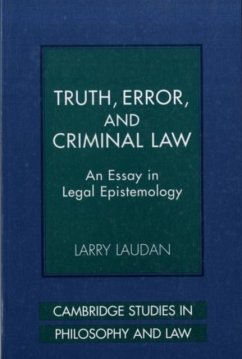Beginning with the premise that the principal function of a criminal trial is to find out the truth about a crime, Larry Laudan examines the rules of evidence and procedure that would be appropriate if the discovery of the truth were, as higher courts routinely claim, the overriding aim of the criminal justice system. Laudan mounts a systematic critique of existing rules and procedures that are obstacles to that quest. He also examines issues of error distribution by offering the first integrated analysis of the various mechanisms - the standard of proof, the benefit of the doubt, the presumption of innocence and the burden of proof - for implementing society's view about the relative importance of the errors that can occur in a trial.
Dieser Download kann aus rechtlichen Gründen nur mit Rechnungsadresse in A, B, BG, CY, CZ, D, DK, EW, E, FIN, F, GR, HR, H, IRL, I, LT, L, LR, M, NL, PL, P, R, S, SLO, SK ausgeliefert werden.


